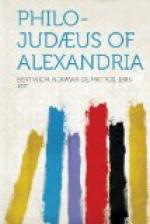The noble pessimism of Philo’s early days was replaced by a noble optimism in his maturity, in which he trusted implicitly in God’s grace, and believed that God vouchsafed to the good man the knowledge of Himself without its being necessary for him to inflict chastisements upon his body or uproot his inclinations. In this mood moderation is represented as the way of salvation; the abandonment of family and social life is selfish, and betrays a lack of the humanity which the truly good man must possess.[65] Of Philo’s own domestic life we catch only a fleeting glimpse in his writings. He realized the place of woman in the home; “her absence is its destruction,” he said; and of his wife it is told in another of the “Fragments” that when asked one day in an assembly of women why she alone did not wear any golden ornament, she replied, “The virtue of a husband is a sufficient ornament for his wife.”
Though in his maturity Philo renounced the ascetic life, his ideal throughout was a mystical union with the Divine Being. To a certain school of Judaism, which loves to make everything rational and moderate, mysticism is alien; it was alien indeed to the Sadducee realist and the Karaite literalist; it was alien to the systematic Aristotelianism of Maimonides, and it is alien alike to Western orthodox and Reform Judaism. But though often obscured and crushed by formal systems, mysticism is deeply seated in the religious feelings, and the race which has developed the Cabbalah and Hasidism cannot be accused of lack of it. Every great religion fosters man’s aspiration to have direct communion with God in some super-rational way. Particularly should this be the case with a religion which recognizes no intermediary. The Talmudic conceptions of [Hebrew: nb’a], prophecy, [Hebrew: shkyna], the Divine Presence, and [Hebrew: rua hkdsh], the holy spirit, which was vouchsafed to the saint, certainly are mystic, and at Alexandria similar ideas inspired a striking development. Once again we can trace the fertilizing influence of Greek ideas. Even when the old naturalistic cults had flourished in Greece, and political life had provided a worthy goal for man, mystical beliefs and ceremonies had a powerful attraction for the Hellene; and, when the belief in the old gods had been shattered, and with the national greatness the liberal life of the State had passed away, he turned more and more to those rites which professed to provide healing and rest for the sickening soul. Many of the Alexandrian Jews must have been initiated into these Greek mysteries, for Philo introduces into his exegesis of the law of Moses an ordinance forbidding the practice.[66] He himself advocates a more spiritual mysticism, and it is a cardinal principle of his philosophy to treat the human soul as a god within and its absorption in the universal Godhead as supreme bliss, the end of all endeavor. He claimed to have attained, himself, to this union, and to have received direct




